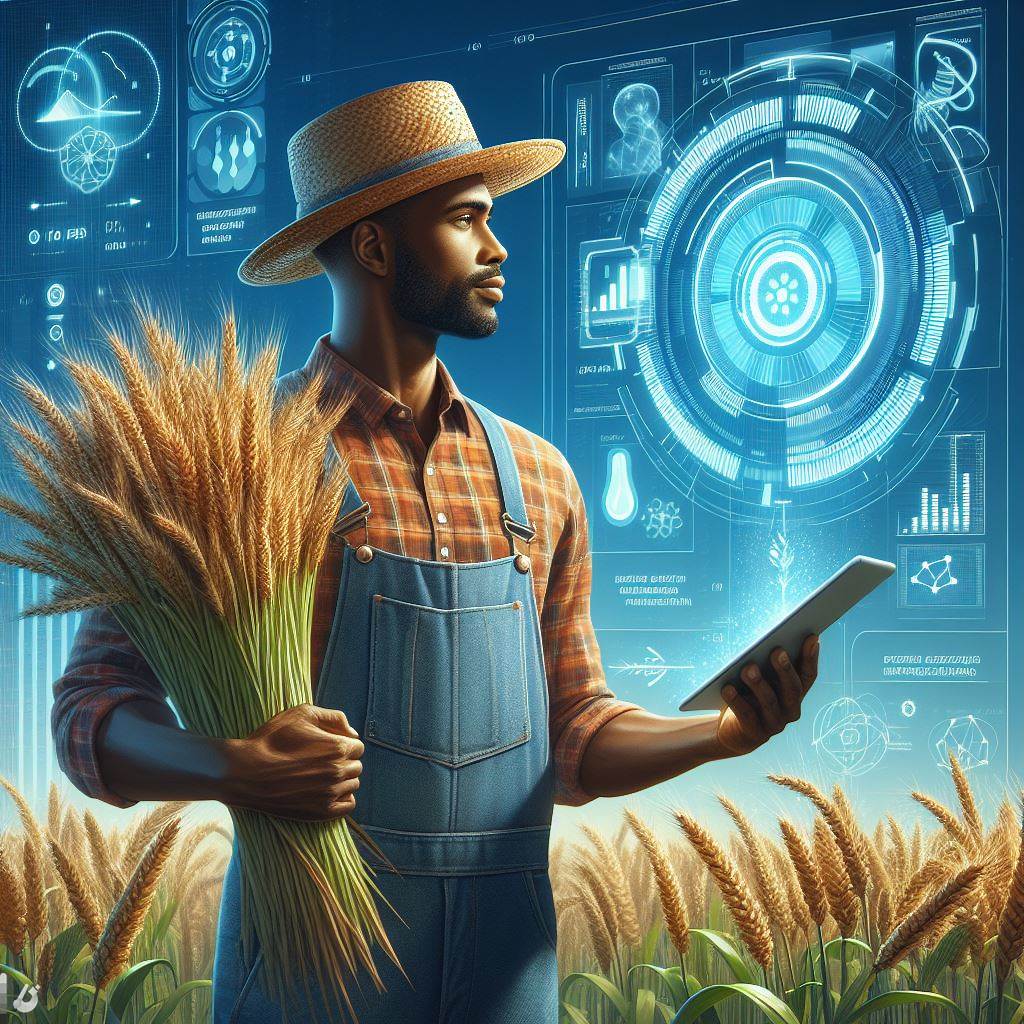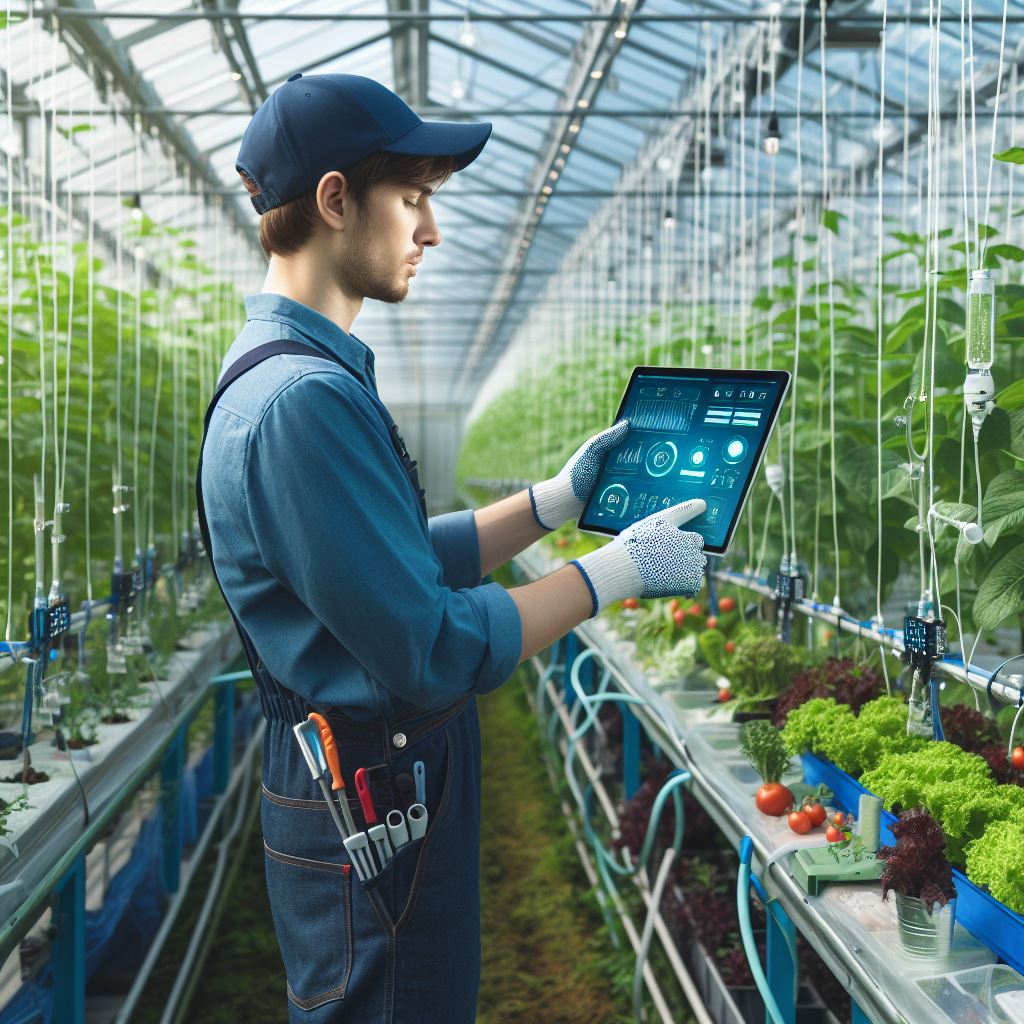Introduction
Bio-tech breakthroughs in farming have revolutionized agriculture, leading to improved crop yields and sustainability.
These advancements have had a profound impact on food production, environmental conservation, and global economic development.
Introduction of genetically modified organisms (GMOs), precision agriculture, and biotechnology have significantly increased productivity, reduced the need for pesticides, and improved crop resilience to climate change.
Traditional farming methods are being replaced with innovative techniques like hydroponics, vertical farming, and aeroponics, which maximize land use and minimize water consumption.
These breakthroughs have not only addressed the issue of food scarcity but also helped in the production of nutrient-rich crops and the development of new pharmaceuticals.
Furthermore, they have contributed to reducing soil erosion, greenhouse gas emissions, and water pollution caused by conventional farming practices.
Additionally, bio-tech advancements in farming have provided new opportunities for farmers by enabling the production of high-value crops and facilitating precision farming techniques, such as remote sensing, data analytics, and precision spraying.
The economic implications are significant, as bio-tech breakthroughs have not only increased farmers’ profits but also provided employment opportunities in research and development, manufacturing, and logistics sectors.
Moreover, these advancements have the potential to alleviate poverty and improve food security in developing countries.
In short, bio-tech breakthroughs in farming have revolutionized agriculture by enhancing productivity, sustainability, and economic growth while addressing the challenges posed by population growth, climate change, and limited resources.
Definition of Bio-Tech in Farming
What Bio-Tech Entails in the Context of Farming
Bio-tech in farming refers to the use of biological processes and technology to improve agricultural practices.
The Role of Bio-Tech in Revolutionizing Agriculture
Bio-tech transforms farming, enhancing yields through genetic engineering and cutting-edge techniques.
Genetic modification creates resilient crops with increased yields.
Precision agriculture optimizes practices with sensors, drones, and satellite imagery.
Farmers monitor real-time crop growth, soil conditions, and water usage, reducing costs and environmental impact.
Bio-tech revolutionizes livestock farming, breeding healthier and more productive animals through genetic manipulation.
It supports sustainable practices with environmentally-friendly alternatives to traditional fertilizers and pesticides.
Biofuels, derived from agricultural crops, provide greener alternatives, reducing greenhouse gas emissions.
In fact, bio-tech in farming employs biological processes and technology, revolutionizing agriculture for enhanced practices and sustainability.
Read: Agri Supply Chain Optimization
Key Bio-Tech Breakthroughs in Farming
The advancements in biotechnology have brought significant breakthroughs to the field of farming, revolutionizing traditional agricultural practices.
These key bio-tech breakthroughs include genetically modified organisms (GMOs), precision agriculture, vertical farming, automated systems, and gene editing.
Genetically Modified Organisms (GMOs)
GMOs, or genetically modified organisms, involve altering an organism’s genetic material using biotechnology techniques.
This allows for the introduction of desirable traits such as increased resistance to pests, improved nutritional content, and enhanced crop yields.
However, the use of GMOs has sparked debates regarding their potential environmental impact and effects on human health.
Precision Agriculture
Precision agriculture refers to the use of advanced technologies to optimize farming practices.
GPS and remote sensing technologies play a crucial role in precision agriculture by enabling precise monitoring and management of agricultural activities.
Farmers can leverage real-time data to make informed decisions about irrigation, fertilization, and pest control, thereby enhancing overall farming efficiency and reducing resource wastage.
Vertical Farming
Vertical farming is an innovative approach that involves cultivating crops in vertically stacked layers.
By utilizing controlled environments, artificial lighting, and hydroponic systems, vertical farming maximizes land use and allows for year-round production.
This method offers increased crop yields, minimizes water usage, and reduces the dependency on traditional agricultural practices.
Automated Systems
Automation has revolutionized farming through the use of robots and drones.
These automated systems can perform various tasks, including seeding, spraying pesticides, and monitoring crop health.
By reducing the reliance on manual labor, automated systems increase productivity, improve efficiency, and enable precise and targeted farming operations.
Gene Editing
Gene editing techniques, such as CRISPR-Cas9, have opened up new possibilities in agriculture.
Gene editing allows for precise modifications in plant and animal DNA, offering potential benefits such as disease resistance, increased yield, and improved nutritional content.
However, ethical considerations and regulations surround the use of gene editing in farming.
Overall, these key bio-tech breakthroughs in farming have the potential to revolutionize the way we produce food.
They offer opportunities for increased efficiency, higher crop yields, improved sustainability, and enhanced food security.
However, it is essential to evaluate the environmental and societal implications while harnessing the advantages of these technologies to ensure a balanced and sustainable future for agriculture.
Read: Risk Management in Farming
Examples of Successful Bio-Tech Breakthroughs
Actual instances where bio-tech breakthroughs have been implemented successfully
- Genetically modified crops: Companies like Monsanto and Syngenta have developed crops that are resistant to pests, diseases, and herbicides.
- Bt cotton: This genetically modified crop contains a gene from the Bacillus thuringiensis bacteria, making it resistant to bollworms.
- Golden Rice: Scientists have successfully genetically engineered rice to produce beta-carotene, addressing vitamin A deficiency in developing countries.
- Improved animal breeding: Biotechnology has allowed for the selection of animals with desirable traits, resulting in increased productivity and disease resistance.
- Cloning and genetic preservation: The successful cloning of animals like Dolly the sheep and preservation of endangered species have been achievements in bio-tech.
The outcomes and positive impact of these breakthroughs
- Increased crop yields and reduced use of pesticides: Genetically modified crops have shown higher yields due to resistance to pests and diseases, contributing to food security.
- Improved nutritional content: Golden Rice’s bio-fortification of beta-carotene addresses vitamin A deficiency, preventing blindness and promoting better health.
- Enhanced crop quality: Genetic modification has led to crops with improved traits like longer shelf life, increased flavor, and enhanced nutrient content.
- Sustainable agriculture practices: Bio-tech breakthroughs allow farmers to use fewer chemicals, leading to reduced environmental impact and soil degradation.
- Economic benefits for farmers: Implementing bio-tech solutions brings higher profits as farmers face fewer crop losses and increased market value for improved quality.
- Conservation and preservation of biodiversity: Cloning and genetic preservation techniques have played a crucial role in saving endangered species from extinction and maintaining ecological balance.
In general, bio-tech breakthroughs in farming have had significant positive impacts, creating a more sustainable and productive agriculture system.
With genetically modified crops, farmers can achieve higher yields, reduced pesticide use, and improved crop quality.
Moreover, bio-tech advancements have addressed nutritional deficiencies, improved animal breeding, and enabled the preservation of endangered species.
These successful instances illustrate the potential of bio-tech in overcoming agricultural challenges and benefitting both farmers and consumers.
Read: Sustainable Practices in Agribusiness

Challenges and Ethical Considerations
- A potential challenge related to bio-tech breakthroughs in farming is the resistance from traditional farmers.
- These farmers may fear that these new technologies will replace their traditional farming practices.
- Another concern is the potential impact of genetically modified crops on biodiversity in farming ecosystems.
- The introduction of genetically modified organisms (GMOs) may disrupt the balance of natural ecosystems.
- Furthermore, there is a growing concern about the use of pesticides and herbicides in bio-tech farming.
- Some argue that the increased use of chemicals can have negative effects on the environment and human health.
- Additionally, there are ethical considerations regarding the ownership of genetically modified seeds.
- Large biotechnology corporations patent their modified seeds, limiting access to farmers and increasing monopolies.
- This raises questions about equitable access to resources and the concentration of power in the hands of a few.
- Moreover, the long-term effects of bio-tech breakthroughs on human health are still not fully understood.
- Although GMOs are extensively tested, some argue that the potential risks are not adequately assessed.
- There is also concern about cross-contamination between genetically modified and non-modified crops.
- This can lead to unintentional spreading of modified genes and potentially irreversible changes to natural species.
Environmental impact and food safety are key ethical considerations in bio-tech farming
- One of the main concerns is the impact on ecosystems and the loss of biodiversity.
- Genetically modified crops may disrupt the delicate balance of natural habitats and harm wildlife.
- This raises questions about the long-term sustainability of bio-tech farming practices.
- Additionally, the use of pesticides and herbicides can have harmful effects on non-target organisms.
- Bees and other pollinators, for instance, can be negatively affected by these chemicals.
- Food safety is another critical ethical consideration when it comes to bio-tech farming.
- Consumers have a right to know what they are eating and make informed choices about their food.
- The labeling of genetically modified products is a controversial issue in many countries.
- Some argue that consumers should have the right to choose whether to consume GMOs or not.
- Others argue that labeling is unnecessary since GMOs are safe to consume.
In a nutshell, bio-tech breakthroughs in farming bring both challenges and ethical considerations.
Transform Your Agribusiness
Unlock your farm's potential with expert advice tailored to your needs. Get actionable steps that drive real results.
Get StartedAddressing potential challenges and concerns related to these breakthroughs is crucial for their acceptance and successful implementation.
Ethical considerations, such as the environmental impact and food safety, must also be carefully addressed to ensure responsible and sustainable bio-tech farming practices.
Read: Crop Diversification Strategies
Future Prospects of Bio-Tech in Farming
The potential for further advancement in bio-tech efforts
- Bio-tech advancements will continue to revolutionize farming, increasing productivity and sustainability.
- Research and development will lead to the discovery of more efficient genetically modified crops.
- Scientists will focus on enhancing crop traits such as drought resistance, disease resistance, and nutrient content.
- Genome editing technologies like CRISPR will allow precise modifications in plant genes for desired traits.
- Bio-tech companies will collaborate with farmers and scientists to improve existing agricultural practices.
- Further investment in bio-tech research will give rise to new farming techniques and innovative solutions.
- The application of artificial intelligence will optimize crop yields by analyzing vast amounts of data.
- Bio-tech will enable the development of sustainable farming methods that minimize the use of chemicals.
- Efforts will be made to reduce the environmental impact of farming through bio-tech interventions.
- New technologies will allow farmers to grow crops in unconventional environments, such as urban areas.
Exciting possibilities that bio-tech may offer in the future for farmers
- Bio-tech advancements will pave the way for personalized nutrition by producing crops tailored to individual needs.
- Farmers will have access to crops with increased nutritional value, benefiting both humans and animals.
- Gene editing could lead to the development of allergen-free crops, reducing allergic reactions in consumers.
- Bio-tech may enable the production of crops with enhanced flavors, textures, and aromas, enhancing culinary experiences.
- Farmers will be able to cultivate crops with improved shelf life and reduced post-harvest losses.
- Bio-tech could provide solutions to global food security challenges by increasing crop resilience and productivity.
- Genetically modified crops may be engineered to require fewer pesticides and fertilizers, reducing input costs.
- Disease-resistant crops could minimize yield losses caused by pests and diseases, ensuring better harvests.
- Bio-tech may contribute to the development of alternative protein sources like lab-grown meat and plant-based alternatives.
- Through bio-tech, farmers can reduce water usage and improve water efficiency in agriculture, conserving resources.
- Future bio-tech breakthroughs will empower farmers to meet the growing demand for sustainably produced food.
In summary, the future prospects of bio-tech in farming are incredibly promising.
The potential for further advancements in bio-tech efforts is immense, with research and development continuously pushing the boundaries of agricultural innovation.
Exciting possibilities await farmers, from tailored nutrition and improved flavors to increased crop resilience and sustainable practices.
By embracing bio-tech, farmers can seize the opportunities that lie ahead and contribute to a more productive, efficient, and sustainable agricultural future.
Conclusion
Recap the key points discussed in the blog post
Throughout this blog post, we have explored the impressive bio-tech breakthroughs in farming.
We have discussed how genetic engineering has allowed for the development of crops that are more resistant to pests and diseases, resulting in higher yields.
Additionally, we have examined the use of biotechnology in livestock farming, which has improved animal health and enhanced the quality of meat and dairy products.
The importance of bio-tech breakthroughs in farming
Bio-tech breakthroughs in farming hold immense significance in addressing the global challenges of food security and sustainability.
These innovations enable farmers to produce more food with fewer resources, reducing pressure on the environment and ensuring a stable food supply for a growing population.
Additionally, bio-tech advancements contribute to the reduction of chemical pesticide and fertilizer use, promoting sustainable and eco-friendly agricultural practices.
Leaving the readers with a compelling final thought or call to action
As we move forward, it is crucial to recognize the pivotal role that bio-tech breakthroughs play in revolutionizing the agricultural sector.
By supporting continued research and development in this field, we can further unlock the potential of bio-technology to address food insecurity, mitigate climate change impacts, and create a more sustainable and resilient future for all.
Let us embrace these innovations and work together towards a brighter and more prosperous agricultural industry.




